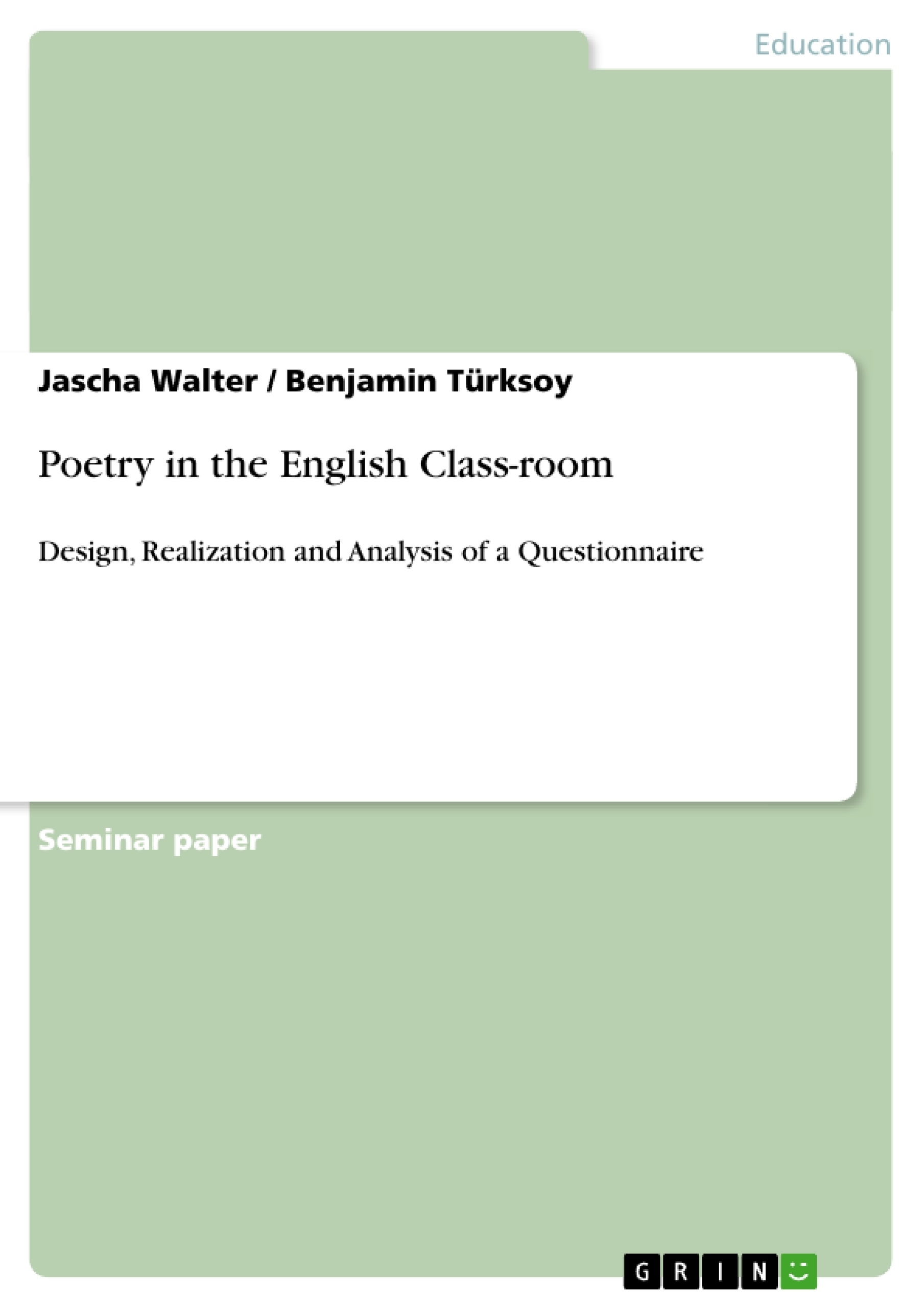In the seminar dealing with poetry in language education we decided to investigate contemporary students’ attitude towards poetry, furthermore their experiences with poetry in school. The most appropriate way to achieve reasonable results to this question seemed to be a questionnaire, which we planned to hand in in class and analyze later on at home. With regard to a useful target group we finally decided to deal with a grammar school’s senior class, close to university campus in a wealthy district of Hamburg and with a strong probability of a high educational level in the family background. In an area with such conditions we assumed to find students that had come in touch with poetry more often than students with a less sophisticated background. Beginning with developing a research design, the main research question and the questionnaire, we aimed at the students’ personal interest in poetry, their experiences with poetry in their leisure time and their poetry experiences during English classes. The core of our project lies in the verification or falsification of a thesis by Hans Magnus Enzensberger, containing that most students’ experiences with poetry at school, especially the way poetry is taught at school, have a demotivating effect on the students’ general attitude towards poetry.
Inhaltsverzeichnis (Table of Contents)
- Introduction
- Planning the Research Project
- Developing the Research Question
- Its Relevance for the Language Classroom
- Research Design Development
- Carrying out the Project
- What really happened?
- Data obtained
- Evaluation of Data
- Reflections
- Chances and Limitations of Design and possible Improvements
- Significance of Research Project for the Language Classroom
- Individual Evaluation of the Project
- Benjamin Türksoy's individual Evaluation
- Jascha Walter's individual Evaluation
- Works cited
Zielsetzung und Themenschwerpunkte (Objectives and Key Themes)
This research project aims to investigate contemporary students' attitudes towards poetry and their experiences with poetry in school. The project's main objective is to analyze the validity of a thesis proposed by Hans Magnus Enzensberger, which suggests that traditional poetry education has a demotivating effect on students' overall interest in poetry. The project utilizes a questionnaire to gather data from a group of grammar school seniors in Hamburg. Key themes and ideas explored in this project include:- Students' perceptions of poetry and its relevance in their lives
- The influence of school-based poetry instruction on students' attitudes
- The effectiveness of various methods for teaching poetry in the classroom
- Enzensberger's thesis regarding the demotivating effects of traditional poetry education
- The potential for engaging students in poetry and fostering a positive relationship with this literary form
Zusammenfassung der Kapitel (Chapter Summaries)
Introduction
This chapter introduces the research project and outlines its goals. It explains the rationale for choosing a questionnaire as the primary research method and specifies the target group: a senior class at a grammar school in Hamburg. The introduction also presents Hans Magnus Enzensberger's thesis, which serves as the project's central focus.Planning the Research Project
This chapter details the planning process, including the development of the research question, the selection of the target group, and the design of the questionnaire. The authors discuss the importance of ensuring the relevance and clarity of the questionnaire's questions and the benefits of seeking feedback from peers and mentors during the design phase.Developing the Research Question
This chapter delves deeper into the research question, highlighting the authors' personal interest in understanding students' perceptions of poetry and the role of school-based instruction in shaping these views. The chapter references Enzensberger's work, which provides a theoretical framework for understanding the potential demotivating effects of traditional poetry education.Its Relevance for the Language Classroom
This chapter explores the implications of Enzensberger's thesis for contemporary language classrooms. The authors question the ongoing relevance of poetry in schools, particularly if students experience it as demotivating. They acknowledge the limitations of their study, focusing on a specific target group within a single school, but emphasize its potential to provide valuable insights into the broader context of poetry education.Research Design Development
This chapter outlines the specific design of the questionnaire, based on the guidelines of Cohen and Stangl. It details the structure and format of the questionnaire, including the use of seven statements and four answering categories. The authors discuss their decision to omit a middle category for undecided responses and their rationale for reducing the number of answering categories based on feedback from peers.Schlüsselwörter (Keywords)
This project focuses on the relationship between poetry and education, exploring students' attitudes towards poetry and the effectiveness of various pedagogical approaches. Key terms include: poetry education, student perceptions, teaching methods, Enzensberger's thesis, demotivation, questionnaire, and language classroom. The project seeks to understand the influence of traditional poetry education on student engagement and explore strategies for fostering a more positive and engaging relationship between students and poetry.- Quote paper
- Jascha Walter (Author), Benjamin Türksoy (Author), 2007, Poetry in the English Class-room, Munich, GRIN Verlag, https://www.grin.com/document/128336



